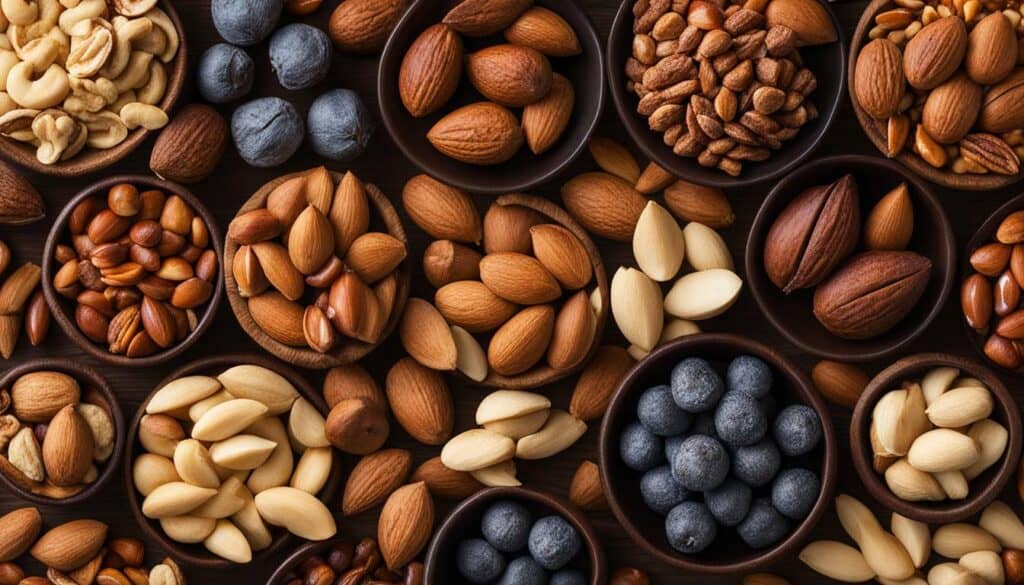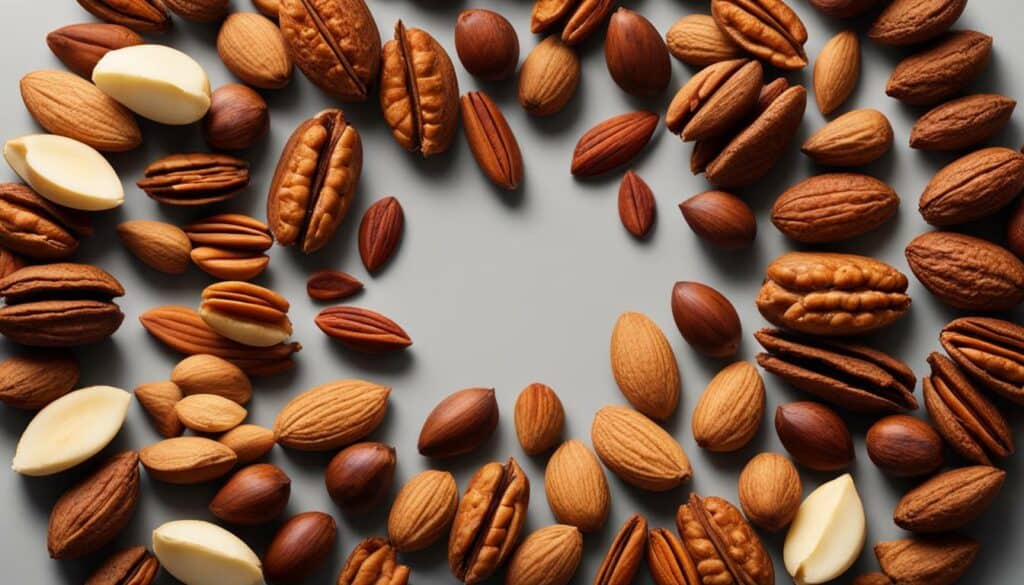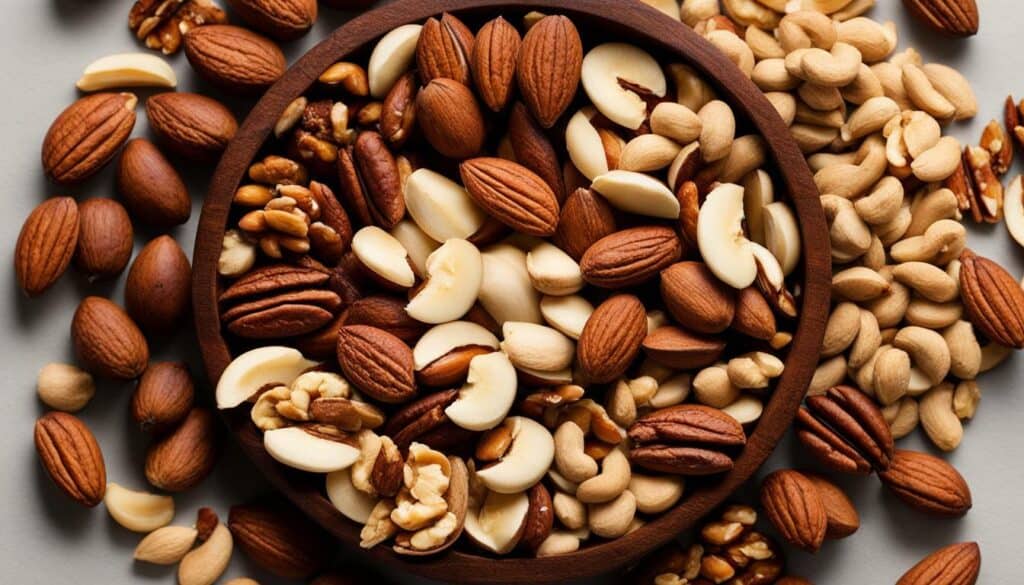Welcome to a fascinating journey into the world of nut facts! Get ready to uncover the secrets behind these nutritious powerhouses.
Nuts are not just delicious snacks; they are packed with numerous health benefits that make them a worthy addition to your diet. From walnuts to pistachios, each nut variety offers unique nutritional advantages that contribute to your overall well-being. Let’s explore some interesting and surprising facts about nuts that will leave you eager to incorporate them into your daily routine.
Key Takeaways:
- Walnuts are the healthiest nuts due to their high antioxidant content and ability to inhibit the growth of “bad” cholesterol.
- Other nuts like Brazil nuts, pistachios, cashews, and hazelnuts also contain antioxidants, although in slightly lower levels.
- Nuts are highly nutritious, rich in fiber, low in saturated fats, and high in beneficial unsaturated fats.
- They are excellent sources of vital nutrients like vitamin E, magnesium, and selenium.
- Nuts are loaded with antioxidants that combat oxidative stress and protect against cell damage.
With their potential to aid in weight loss, lower cholesterol and triglyceride levels, and even benefit individuals with type 2 diabetes and metabolic syndrome, nuts offer a wide range of health advantages. Additionally, their anti-inflammatory properties and high fiber content promote gut health, while also potentially reducing the risk of heart attack and stroke.
Unveil the secrets behind these tiny nutritional powerhouses and unlock a healthier lifestyle by incorporating nuts into your everyday routine!
Why Are Nuts Considered Healthy?
Nuts have long been praised for their impressive health benefits, making them a popular choice among nutrition enthusiasts. These small yet mighty powerhouses are packed with essential nutrients that can contribute to overall well-being. Let’s explore why nuts are considered a healthy addition to your diet.
Firstly, nuts are rich in beneficial unsaturated fats, such as omega-3 fatty acids. These healthy fats have been proven to support heart health by reducing cholesterol levels and lowering the risk of heart disease. Walnuts, in particular, are an excellent source of omega-3 fatty acids, making them a standout nut for cardiovascular health.
Another key feature of nuts is their high fiber content. Fiber not only aids in digestion but also helps regulate blood sugar levels and promotes a feeling of fullness, making nuts a satisfying snack. Additionally, the fiber in nuts promotes gut health by nourishing the beneficial bacteria in our digestive system.
Furthermore, nuts are loaded with antioxidants that can combat oxidative stress and protect against cell damage. Walnuts, in particular, are the healthiest nuts to eat as they are loaded with antioxidants. They contain high levels of polyphenol, an antioxidant that can protect the body from damaging molecules. Other nuts like Brazil nuts, pistachios, cashews, and hazelnuts also contain antioxidants but in slightly lower levels.
| Nutrition Facts | Per 1 ounce (28 grams) |
|---|---|
| Calories | 185 |
| Protein | 4 grams |
| Fat | 18 grams |
| Carbohydrates | 4 grams |
| Fiber | 2 grams |
| Vitamin E | 7% of the recommended daily intake |
| Magnesium | 11% of the recommended daily intake |
| Selenium | 26% of the recommended daily intake |
As shown in the nutrition facts table above, nuts are a great source of nutrients like vitamin E, magnesium, and selenium. These vitamins and minerals play essential roles in supporting various bodily functions, including immune health, bone health, and energy production.
Next time you’re looking for a healthy and satisfying snack, reach for a handful of nuts. Whether you’re enjoying walnuts, almonds, or cashews, you can be confident that you are nourishing your body with a nutrient-dense and delicious food.
Exploring Different Types of Nuts
From creamy cashews to crunchy almonds, the world of nuts offers a diverse range of flavors and textures to suit every palate. Whether you enjoy them as a snack, incorporate them into your cooking, or use them as a garnish, nuts are a versatile ingredient that can add a delightful crunch and a burst of flavor to your meals.
A Variety of Nutty Delights
Let’s take a closer look at some of the most popular and well-loved nuts:
- Almonds: These bite-sized nuts are packed with protein, fiber, and heart-healthy monounsaturated fats. They have a mild, slightly sweet flavor that works well in both savory dishes and desserts.
- Cashews: Known for their rich and buttery taste, cashews are a favorite snack option. They are also a good source of vitamins and minerals, including copper, magnesium, and zinc.
- Walnuts: With their distinct shape and robust flavor, walnuts are a nutritional powerhouse. They are the healthiest nuts to eat as they are loaded with antioxidants and high in polyphenols, which can protect the body from damaging molecules.
- Pistachios: These vibrant green nuts are not only visually appealing but also highly nutritious. They are a good source of protein, fiber, and healthy fats, making them a satisfying and wholesome snack.
- Brazil Nuts: Known for their large size, Brazil nuts are rich in selenium, a mineral that plays a crucial role in supporting our immune system and maintaining thyroid function.
- Hazelnuts: Hazelnuts are known for their sweet, nutty flavor and are often used in desserts like chocolate spreads and pralines. They are rich in healthy fats and vitamin E, an antioxidant that helps protect our cells from damage.
| Nut | Flavor | Nutrition |
|---|---|---|
| Almonds | Mild, slightly sweet | Protein, fiber, monounsaturated fats |
| Cashews | Rich, buttery | Vitamins, minerals |
| Walnuts | Robust | Antioxidants, polyphenols |
| Pistachios | Vibrant, slightly sweet | Protein, fiber, healthy fats |
| Brazil Nuts | Mild, slightly buttery | Selenium |
| Hazelnuts | Sweet, nutty | Healthy fats, vitamin E |
“Nuts are a nutritious snack that is high in fiber, low in saturated fats, high in beneficial unsaturated fats, and very high in antioxidants.” – Nutritional expert
Incorporating a variety of nuts into your diet can provide numerous health benefits. They are a great source of nutrients like vitamin E, magnesium, and selenium, which are essential for maintaining overall wellness. Furthermore, nuts are loaded with antioxidants that can combat oxidative stress and protect against cell damage.
Next time you’re at the grocery store or planning your next meal, take a moment to explore the wide array of nuts available. Experiment with different flavors, try new recipes, and reap the delicious and nutritious rewards that nuts have to offer.

Did you know that nuts are packed with powerful antioxidants that can help safeguard our cells from harm’s way? It’s true! These small but mighty snacks are loaded with beneficial compounds that can protect our bodies against oxidative stress and cell damage. Walnuts, in particular, are hailed as the reigning champions of antioxidants among nuts.
Why are antioxidants important? Well, they play a crucial role in neutralizing harmful molecules called free radicals, which are known to contribute to various diseases and accelerate aging. By consuming nuts, we can arm our bodies with these natural defenders and give our cells an extra layer of protection.
But walnuts aren’t the only nut with antioxidant powers. Brazil nuts, pistachios, cashews, and hazelnuts also contain notable levels of antioxidants, although slightly lower than walnuts. These delicious nuts offer a variety of flavors, textures, and health benefits, making them a great addition to any diet.
| Nut | Antioxidant Content |
|---|---|
| Walnuts | High |
| Brazil nuts, pistachios, cashews, and hazelnuts | Moderate |
Aside from their antioxidant content, nuts are also rich in other essential nutrients, such as vitamin E, magnesium, and selenium. These nutrients contribute to overall well-being and support various bodily functions. Furthermore, nuts are high in beneficial unsaturated fats, low in saturated fats, and packed with fiber, making them a heart-healthy snack option.

So, the next time you’re looking for a nutritious snack, reach for a handful of nuts. Not only will you enjoy their crunchy texture and delicious taste, but you’ll also reap the numerous health benefits they have to offer. From their antioxidant power to their heart-protective properties and potential weight management benefits, nuts truly are nutritional powerhouses!
Weight Loss and Nut Consumption
Contrary to popular belief, incorporating nuts into your diet can actually be beneficial for weight loss efforts. While nuts are often seen as high in fat and calories, they are also packed with essential nutrients that can support a healthy lifestyle.

Nuts are a great source of protein, fiber, and healthy fats, which can help keep you feeling full and satisfied. This can prevent overeating and unnecessary snacking throughout the day. Additionally, the combination of protein, fiber, and healthy fats can help regulate blood sugar levels and keep energy levels stable, making it easier to stick to a calorie-controlled diet.
Incorporating a variety of nuts into your meals and snacks can also add a delicious crunch and flavor to your diet, making it more enjoyable and satisfying. From a handful of almonds as a mid-morning snack to sprinkling chopped walnuts on your salad, there are numerous ways to incorporate nuts into your daily routine.
It’s important to note that while nuts can support weight loss efforts, portion control is key. Nuts are calorie-dense, so it’s best to enjoy them in moderation. A small handful of nuts (about 1 ounce) is typically a recommended serving size. If you’re unsure about the appropriate portion size for your specific dietary needs, consulting with a registered dietitian can provide personalized guidance.
Nuts and Heart Health
Nuts not only tantalize your taste buds but also have a special place in keeping your heart healthy and happy. These tiny powerhouses of nutrition offer a multitude of health benefits, including reducing the risk of heart attack and stroke. Loaded with antioxidants and beneficial fats, nuts are a heart-healthy addition to your diet.
Walnuts, in particular, take the crown as the healthiest nuts to eat. They are packed with antioxidants, especially polyphenols, which help protect the body from damaging molecules. This delicious nut also inhibits the growth of “bad” cholesterol, reducing the risk of heart disease.
But walnuts aren’t the only nuts that contribute to heart health. Brazil nuts, pistachios, cashews, and hazelnuts also contain antioxidants, although in slightly lower levels. These nuts are high in beneficial unsaturated fats and low in saturated fats. They are also a great source of nutrients like vitamin E, magnesium, and selenium, all of which play a crucial role in heart health.
| Nut Type | Antioxidant Content | Benefits |
|---|---|---|
| Walnuts | High | Inhibit “bad” cholesterol |
| Brazil Nuts | Moderate | Rich in selenium |
| Pistachios | Moderate | Lower blood pressure |
| Cashews | Moderate | Boost heart health |
| Hazelnuts | Moderate | Improve blood vessel function |
Incorporating a variety of nuts into your diet can lead to significant improvements in heart health. Their anti-inflammatory properties, high fiber content, and beneficial fats all contribute to a healthier cardiovascular system. So why not grab a handful of nuts today and give your heart the love it deserves?

Can’t get enough of the amazing benefits of nuts? Stay tuned for the next section where we will explore the impact of nuts on gut health.
It turns out that adding a handful of nuts to your daily routine can do wonders for your gut health. Nuts are not only delicious but also packed with beneficial nutrients and fiber that can improve your digestive system. They can help regulate bowel movements, promote the growth of healthy gut bacteria, and reduce the risk of certain digestive disorders.
Nuts are rich in fiber, which acts as food for the good bacteria in your gut. This fiber helps promote the growth of beneficial gut bacteria, which play a crucial role in maintaining a healthy digestive system. A study published in the Journal of Nutrition found that individuals who consumed nuts regularly had a higher abundance of beneficial gut bacteria compared to those who didn’t consume nuts.

In addition to fiber, nuts are also packed with antioxidants that can combat oxidative stress and inflammation in the gut. These antioxidants help protect the gut lining from damage and reduce the risk of gastrointestinal diseases. The high levels of polyphenols found in nuts, especially walnuts, have been linked to a lower risk of colon cancer and improved gut health.
To reap the gut health benefits of nuts, it’s best to consume a variety of them. Almonds, walnuts, pistachios, and pecans are particularly beneficial for gut health. You can incorporate nuts into your diet by adding them to salads, yogurt, oatmeal, or simply snacking on them throughout the day. However, it’s essential to consume nuts in moderation as they are high in calories.
Benefits of Nuts for Gut Health:
- Rich in fiber, which supports healthy bowel movements and promotes the growth of beneficial gut bacteria.
- Packed with antioxidants that protect the gut lining from damage and reduce the risk of gastrointestinal diseases.
- Variety is key – different nuts offer unique benefits. Almonds, walnuts, pistachios, and pecans are particularly beneficial for gut health.
- Enjoy nuts in moderation as part of a balanced diet to maintain a healthy gut and overall well-being.
| Nut Type | Fiber Content (per 1 oz) |
|---|---|
| Almonds | 3.5 grams |
| Walnuts | 1.9 grams |
| Pistachios | 2.9 grams |
| Pecans | 2.7 grams |
“A handful of nuts a day keeps your gut healthy and thriving. The combination of fiber and antioxidants found in nuts can improve your gut health and reduce the risk of digestive disorders.”
So, the next time you’re looking for a healthy snack, reach for a handful of nuts. Not only will they satisfy your taste buds, but they will also nourish your gut and support your overall digestive health.
Nuts and Diabetes Management
If you’re managing diabetes or metabolic syndrome, incorporating nuts into your diet might be a wise choice. Nuts are packed with essential nutrients and can provide numerous health benefits for individuals with these conditions. They are a nutritious snack that is high in fiber, low in saturated fats, and rich in beneficial unsaturated fats. Additionally, nuts are loaded with antioxidants that can combat oxidative stress and protect against cell damage.
One of the key advantages of incorporating nuts into your diet when managing diabetes is their ability to regulate blood sugar levels. Despite their relatively high fat content, the fats found in nuts are predominantly healthy fats, which can help improve insulin sensitivity and reduce the risk of developing cardiovascular complications associated with diabetes.
Furthermore, nuts have been shown to have a positive impact on cholesterol and triglyceride levels. Consuming nuts regularly has been linked to lower LDL (bad) cholesterol levels and higher HDL (good) cholesterol levels. This can help reduce the risk of heart disease, which is a common concern for individuals with diabetes.
Overall, nuts are a versatile and convenient addition to a diabetes-friendly diet. Whether enjoyed as a snack on their own, incorporated into meals, or used as a topping for salads or yogurt, nuts can provide a satisfying crunch and a range of health benefits. So go ahead and grab a handful of nuts to support your diabetes management and add some nutty goodness to your day!

| Nut | Antioxidant Level |
|---|---|
| Walnuts | High |
| Brazil nuts | Moderate |
| Pistachios | Moderate |
| Cashews | Moderate |
| Hazelnuts | Moderate |
Nut Trivia: Fun Facts About Nuts
Get ready to impress your friends at your next gathering with these intriguing nut facts that are sure to leave them shell-shocked. Nuts are not just delicious and nutritious, but they also have some fascinating secrets!
- Did you know that peanuts are not actually nuts? They are legumes! Yes, that’s right, peanuts belong to the same family as beans and peas. They grow underground, unlike most other nuts, which grow on trees.
- Almonds, one of the most popular nuts, have a rich history dating back thousands of years. They were mentioned in the Bible and were even found in the tomb of King Tutankhamun in ancient Egypt. Talk about being a nut with royal connections!
- Cashews, another beloved nut, are not technically a nut either. They are seeds that grow on the bottom of cashew apples, which are tropical fruits. These unique seeds are protected by a toxic outer shell that must be carefully removed before the cashews can be enjoyed.
Now, let’s dive into a nutty quote from George Washington Carver, a renowned botanist and inventor:
“I love to think of nature as an unlimited broadcasting station, through which God speaks to us every hour if we will only tune in.” – George Washington Carver
These fascinating nut facts prove that there is always something new to learn and discover about the world of nuts. So, the next time you’re enjoying a handful of your favorite nuts, remember the rich history, unique characteristics, and amazing stories behind these tiny powerhouses of nutrition.
| Nut | Antioxidant Content |
|---|---|
| Walnuts | High |
| Brazil Nuts | Moderate |
| Pistachios | Moderate |
| Cashews | Moderate |
| Hazelnuts | Moderate |

Conclusion
After this deep dive into the world of nut facts, it’s clear that these tiny powerhouses are worth cracking open for their incredible health benefits. From walnuts to Brazil nuts, pistachios to cashews, and hazelnuts to almonds, each nut offers its own unique set of nutrients and antioxidants.
Walnuts, in particular, stand out as the healthiest nut option. Loaded with antioxidants, they can protect the body from damaging molecules and inhibit the growth of “bad” cholesterol. However, other nuts like Brazil nuts, pistachios, cashews, and hazelnuts also contain antioxidants, although in slightly lower levels.
In addition to their antioxidant content, nuts are a nutritious snack choice. They are high in fiber, low in saturated fats, and rich in beneficial unsaturated fats. They are also packed with essential nutrients such as vitamin E, magnesium, and selenium.
Furthermore, the benefits of nuts extend beyond just their nutritional value. Nuts may aid in weight loss, lower cholesterol and triglyceride levels, and benefit individuals with type 2 diabetes and metabolic syndrome. Their anti-inflammatory properties and high fiber content can improve gut health, while their antioxidants help combat oxidative stress and protect against cell damage. Additionally, nuts may reduce the risk of heart attack and stroke.
FAQ
Q: Are walnuts the healthiest nuts to eat?
A: Yes, walnuts are considered the healthiest nuts to eat due to their high levels of antioxidants and the presence of polyphenol, which protects the body from damaging molecules.
Q: Do other nuts contain antioxidants?
A: Yes, other nuts like Brazil nuts, pistachios, cashews, and hazelnuts also contain antioxidants, although in slightly lower levels compared to walnuts.
Q: What are the nutritional benefits of nuts?
A: Nuts are a nutritious snack that is high in fiber, low in saturated fats, high in beneficial unsaturated fats, and very high in antioxidants. They are also a great source of nutrients like vitamin E, magnesium, and selenium.
Q: Can nuts aid in weight loss?
A: Yes, nuts may aid in weight loss as they can satisfy hunger, boost metabolism, and support healthy eating habits.
Q: Do nuts have any benefits for heart health?
A: Yes, nuts have been shown to lower cholesterol and triglyceride levels, reduce inflammation, and potentially reduce the risk of heart attack and stroke.
Q: How can nuts improve gut health?
A: Nuts are high in beneficial fiber, which can improve gut health and promote a healthy digestive system.
Q: Can nuts benefit individuals with type 2 diabetes and metabolic syndrome?
A: Yes, nuts have been found to benefit individuals with type 2 diabetes and metabolic syndrome by helping regulate blood sugar levels and improving insulin sensitivity.
Q: Are there any fun facts about nuts?
A: Absolutely! Nuts have a rich history and many interesting tidbits. For example, did you know that peanuts are not actually nuts but legumes?
How Many Calories Are in Cream Eggs and Are They Considered Healthy?
The cream egg calorie count revealed shows that these sweet treats can range from 150 to 200 calories per egg. While they may be considered a delicious indulgence, they are not exactly a healthy option due to their high sugar and fat content. Moderation is key when enjoying cream eggs to maintain a balanced diet.





Leave a Reply